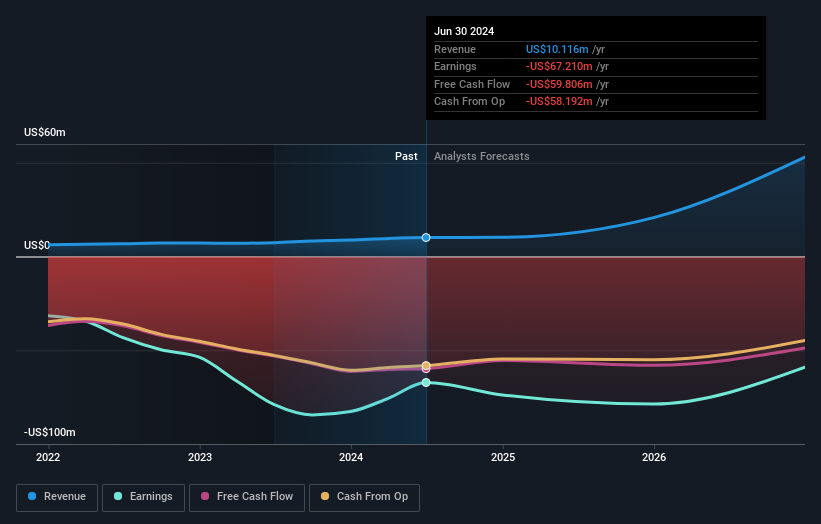D-Wave Quantum Inc. (NYSE:QBTS) surges 14%; individual investors who own 52% shares profited along with institutions
Key Insights
- D-Wave Quantum's significant individual investors ownership suggests that the key decisions are influenced by shareholders from the larger public
- 47% of the business is held by the top 25 shareholders
- Institutions own 47% of D-Wave Quantum
A look at the shareholders of D-Wave Quantum Inc. (NYSE:QBTS) can tell us which group is most powerful. We can see that individual investors own the lion's share in the company with 52% ownership. Put another way, the group faces the maximum upside potential (or downside risk).
Following a 14% increase in the stock price last week, individual investors profited the most, but institutions who own 47% stock also stood to gain from the increase.
Let's delve deeper into each type of owner of D-Wave Quantum, beginning with the chart below.
View our latest analysis for D-Wave Quantum

What Does The Institutional Ownership Tell Us About D-Wave Quantum?
Many institutions measure their performance against an index that approximates the local market. So they usually pay more attention to companies that are included in major indices.
As you can see, institutional investors have a fair amount of stake in D-Wave Quantum. This can indicate that the company has a certain degree of credibility in the investment community. However, it is best to be wary of relying on the supposed validation that comes with institutional investors. They too, get it wrong sometimes. It is not uncommon to see a big share price drop if two large institutional investors try to sell out of a stock at the same time. So it is worth checking the past earnings trajectory of D-Wave Quantum, (below). Of course, keep in mind that there are other factors to consider, too.

D-Wave Quantum is not owned by hedge funds. Public Sector Pension Investment Board is currently the largest shareholder, with 30% of shares outstanding. BDC Capital Inc. is the second largest shareholder owning 4.7% of common stock, and BlackRock, Inc. holds about 3.1% of the company stock.
Our studies suggest that the top 25 shareholders collectively control less than half of the company's shares, meaning that the company's shares are widely disseminated and there is no dominant shareholder.
Researching institutional ownership is a good way to gauge and filter a stock's expected performance. The same can be achieved by studying analyst sentiments. There are plenty of analysts covering the stock, so it might be worth seeing what they are forecasting, too.
Insider Ownership Of D-Wave Quantum
The definition of an insider can differ slightly between different countries, but members of the board of directors always count. Management ultimately answers to the board. However, it is not uncommon for managers to be executive board members, especially if they are a founder or the CEO.
I generally consider insider ownership to be a good thing. However, on some occasions it makes it more difficult for other shareholders to hold the board accountable for decisions.
We can report that insiders do own shares in D-Wave Quantum Inc.. In their own names, insiders own US$2.9m worth of stock in the US$201m company. This shows at least some alignment. You can click here to see if those insiders have been buying or selling.
General Public Ownership
The general public -- including retail investors -- own 52% of D-Wave Quantum. With this amount of ownership, retail investors can collectively play a role in decisions that affect shareholder returns, such as dividend policies and the appointment of directors. They can also exercise the power to vote on acquisitions or mergers that may not improve profitability.
Next Steps:
While it is well worth considering the different groups that own a company, there are other factors that are even more important. Be aware that D-Wave Quantum is showing 5 warning signs in our investment analysis , and 2 of those are concerning...
If you would prefer discover what analysts are predicting in terms of future growth, do not miss this free report on analyst forecasts.
NB: Figures in this article are calculated using data from the last twelve months, which refer to the 12-month period ending on the last date of the month the financial statement is dated. This may not be consistent with full year annual report figures.
Have feedback on this article? Concerned about the content? Get in touch with us directly. Alternatively, email editorial-team (at) simplywallst.com.
This article by Simply Wall St is general in nature. We provide commentary based on historical data and analyst forecasts only using an unbiased methodology and our articles are not intended to be financial advice. It does not constitute a recommendation to buy or sell any stock, and does not take account of your objectives, or your financial situation. We aim to bring you long-term focused analysis driven by fundamental data. Note that our analysis may not factor in the latest price-sensitive company announcements or qualitative material. Simply Wall St has no position in any stocks mentioned.
 Index Options
Index Options CME Group
CME Group Nasdaq
Nasdaq Cboe
Cboe TradingView
TradingView Wall Street Journal
Wall Street Journal